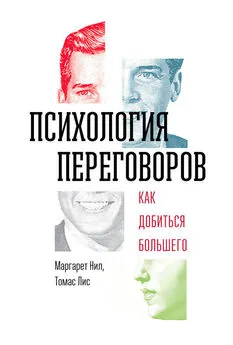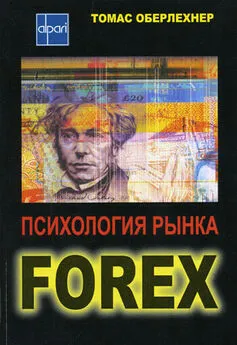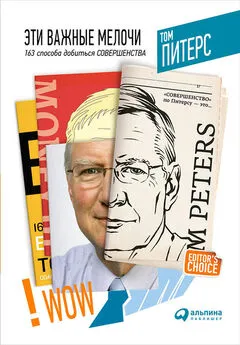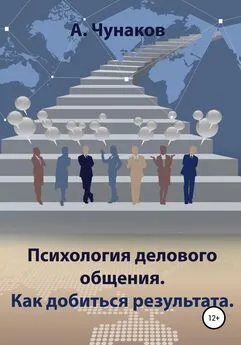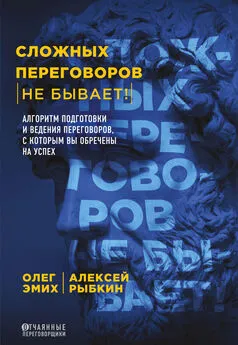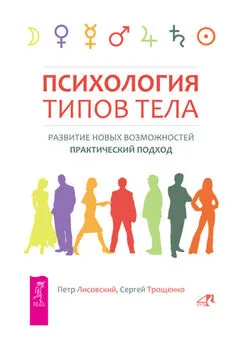Томас Лис - Психология переговоров. Как добиться большего
- Название:Психология переговоров. Как добиться большего
- Автор:
- Жанр:
- Издательство:Манн, Иванов и Фербер
- Год:2016
- Город:Москва
- ISBN:978-5-00100-067-9
- Рейтинг:
- Избранное:Добавить в избранное
-
Отзывы:
-
Ваша оценка:
Томас Лис - Психология переговоров. Как добиться большего краткое содержание
Эта книга написана не только для тех, кому нравится договариваться, но и для тех, кто переговоров избегает, а также для тех, кому сложно понять, угадал он или прогадал, вступив в переговоры. В ней нашли отражение результаты эмпирических исследований, которые авторы проводили на протяжении нескольких десятилетий, тщательно анализируя различные стратегии и проверяя их эффективность в различных условиях применения.
Книга будет полезна всем, кому приходится вступать в переговоры и вести их – как на работе, так и в повседневной жизни и в семье.
На русском языке публикуется впервые.
Психология переговоров. Как добиться большего - читать онлайн бесплатно ознакомительный отрывок
Интервал:
Закладка:
87
Tversky A., Kahneman D. The framing of decisions and the psychology of choice // Science. – 1981. – № 40. – P. 453–463.
88
Пример взят из книги: Dixit A. K., Nalebuff B. J. Thinking Strategically: The Competitive Edge in Business, Politics, and Everyday Life. – New York, London: W.W. Norton & Company, 1993.
89
Lerner M. J. The belief in a just world. – Springer US, 1980. – P. 9–30.
90
Lerner M. J., Miller D. T. Just world research and the attribution process: Looking back and ahead // Psychological bulletin. – 1978. – № 85(5). – P. 1030.
91
20 августа 2012 года Барак Обама сделал следующее заявление: «Мы очень четко дали понять режиму Ассада и другим участникам конфликта, что последней каплей станет информация о применении или перемещении химического оружия. Это полностью изменит нашу позицию и вынудит пересмотреть отношение к происходящему». Из заявления журналистам в Белом доме.
92
Sinaceur M., Neale M. A. Not all threats are created equal: How implicitness and timing affect the effectiveness of threats in negotiations // Group Decision and Negotiation. – 2005. – № 14(1). – P. 63–85.
93
Nierenberg, G. I. The art of negotiating: Psychological strategies for gaining advantageous bargains. – Barnes & Noble Publishing, 1995. – P. 46.
94
Gross J. Emotional regulation in adulthood: Timing is everything // Current Directions in Psychological Science. – 2001. – № 10. – P. 214–219.
95
Gross J. Emotional regulation: Affective, cognitive and social consequences // Psychophysiology. – 2003. – № 39. – P. 281–291.
96
Butler E. A., Egloff B., Wilhelm F. H., Smith N. C., Gross J. J. The social consequences of emotional regulation // Emotions. – 2003. – № 3. – P. 48–67.
97
Zajonc R. B. Feeling and thinking: Preferences need no inferences // American psychologist. – 1980. – № 35(2). – P. 151.
98
Strack F., Martin L. L., Stepper S. Inhibiting and Facilitating Conditions of the Human Smile: A Nonobtrusive Test of the Facial Feedback Hypothesis // Journal of Personality and Social Psychology. – 1998. – № 54. – P. 768.
99
Isen A. M., Daubman K. A., Nowicki G. P. Positive affect facilitates creative problem solving // Journal of personality and social psychology. – 1987. – № 52(6). – P. 1122; Fredrickson B. L. The role of positive emotions in positive psychology: The broaden-and-build theory of positive emotions // American psychologist. – 2001. – № 56(3). – P. 218; Loewenstein G. F., Thompson L., Bazerman M. H. Social utility and decision making in interpersonal contexts // Journal of Personality and Social psychology. – 1989. – № 57(3). – P. 426; Pillutla M. M., Murnighan J. K. Unfairness, anger, and spite: Emotional rejections of ultimatum offers // Organizational Behavior and Human Decision Processes. – 1996. – № 68(3). – P. 208–224; Allred K. G., Mallozzi J. S., Matsui F., Raia C. P. The influence of anger and compassion on negotiation performance // Organizational Behavior and Human Decision Processes. – 1997. – № 70(3). – 175–187.
100
Bodenhausen G. V., Kramer G. P., Süsser K. Happiness and Stereotypic Thinking in Social Judgment // Journal of Personality and Social Psychology. – 1994. – № 66(4). – P. 621. См. также: Bless H., Clore G. L., Schwarz N., Golisano V., Rabe C., Wölk M. Mood and the Use of Scripts: Does a Happy Mood Really Lead to Mindlessness? // Journal of Personality and Social Psychology. – 1996. – № 71(4). – P. 665.
101
Bodenhausen G. V., Sheppard L. A., Kramer G. P. Negative affect and social judgment: The differential impact of anger and sadness // European Journal of Social Psychology. – 1994. – № 24(1). – P. 45–62.
102
Forgas J. P. Don’t worry, be sad! On the cognitive, motivational and interpersonal benefits of negative mood // Current Directions in Psychological Science. – 2013. – № 22. – P. 225–232; Tiedens L. Z., Linton S. Judgment under emotional certainty and uncertainty: the effects of specific emotions on information processing // Journal of personality and social psychology. – 2001. – № 81(6). – P. 973.
103
Tiedens L. Z., Linton S. Judgment under emotional certainty and uncertainty: the effects of specific emotions on information processing // Journal of personality and social psychology. – 2001. – № 81(6). – P. 973.
104
Lerner J. S., Tiedens L. Z. Portrait of the angry decision maker: How appraisal tendencies shape anger’s influence on cognition // Journal of Behavioral Decision Making. – 2006. – № 19(2). – P. 115–137.
105
Lerner J. S., Tiedens L. Z. Цит. соч.: Lerner J. S., Keltner D. Fear, anger, and risk // Journal of personality and social psychology. – 2001. – № 81(1). – P. 146; Shaver P., Schwartz J., Kirson D., O’connor C. Emotion knowledge: further exploration of a prototype approach // Journal of personality and social psychology. – 1987. – № 52(6). – P. 1061.
106
Lerner J. S., Tiedens L. Z. Portrait of the angry decision maker: How appraisal tendencies shape anger’s influence on cognition // Journal of Behavioral Decision Making. – 2006. – № 19(2). – P. 115–137.
107
Carnevale P. J., Isen A. M. The influence of positive affect and visual access on the discovery of integrative solutions in bilateral negotiation // Organizational behavior and human decision processes. – 1986. – № 37(1). – P. 1–13.
108
Anderson N. R., Neale M. A. All fired up but no one to blame // Working paper Stanford Psychology Department, Palo Alto, CA. – 2006.
109
Neale M. A., Wiltermuth S., Cargle C. Emotion and the uncertainty of negotiation // Working paper, Stanford Graduate School of Business. – 2009.
110
Цит. по: Anderson N. R., Neale M. A.
111
Anderson N. R., Neale M. A. The role of emotions and uncertainty in negotiations // Working paper, Psychology Department, Stanford University, Palo Alto, CA. – 2008.
112
Johnson E. J., Tversky A. Representations of perceptions of risks // Journal of Experimental Psychology: General. – 1984. – № 113(1). – P. 55; Isen A. M., Means B. The influence of positive affect on decision-making strategy // Social cognition. – 1983. – № 2(1). – P. 18–31.
113
Lerner J. S., Tiedens L. Z. Portrait of the angry decision maker: How appraisal tendencies shape anger’s influence on cognition // Journal of Behavioral Decision Making. – 2006. – № 19(2). – P. 115–137.
114
Lerner J. S., Keltner D. Fear, anger, and risk // Journal of personality and social psychology. – 2001. – 81(1). – P. 146.
115
Adler R. S., Rosen B., Silverstein E. M. Emotions in Negotiation: How to Manage Fear and Anger // Negotiation Journal. – 1998. – № 14(2). – P. 161–179; Allred K. G. Anger and Retaliation: Toward an Understanding of Impassioned Conflict in Organizations // Research on Negotiation in Organizations. – 1999. – № 7. – P. 27–58; Thompson L. L. The Truth about Negotiations. – Upper Saddle River, NJ: Pearson Education, 2008.
116
Daly J. P. The effects of anger on negotiations over mergers and acquisitions // Negotiation Journal. – 1991. – № 7(1). – P. 31–39.
117
Carnevale P. J. Positive affect and decision frame in negotiation // Group Decision and Negotiation. – 2008. – № 17(1). – P. 51–63.
118
Barsade S. G. The ripple effect: Emotional contagion and its influence on group behavior // Administrative Science Quarterly. – 2002. – № 47(4). – P. 644–675; Forgas J. P. On feeling good and getting your way: mood effects on negotiator cognition and bargaining strategies // Journal of personality and social psychology. – 1998. – № 74(3). – P. 565; Lyubomirsky S., King L., Diener E. The benefits of frequent positive affect: Does happiness lead to success? // Psychological bulletin. – 2005. – № 131(6). – P. 803.
119
Sinaceur M., Tiedens L. Z. Get mad and get more than even: The benefits of anger expressions in negotiations // Journal of Experimental Social Psychology. – 2006. – № 42. – P. 314–322.
120
Van Kleef G. A., De Dreu C. K. W., Manstead A. S. R. The interpersonal effects of anger and happiness in negotiations // Journal of Personality and Social Psychology. – 2004. – № 86. – P. 57–76.
121
Sinaceur M., Vasiljevic D., Neale M. Surprise Expression in Group Decisions: When an Emotional Expression Affects the Quality of Group Members’ Processing and Decision Accuracy. – Working paper, INSEAD, Fountainbleau, France, 2014.
122
Pugh S. D. Service with a smile: Emotional contagion in the service encounter // Academy of management journal – 2001. – № 44(5). – P. 1018–1027; Kopelman S., Rosette A. S., Thompson L. The three faces of Eve: Strategic displays of positive, negative, and neutral emotions in negotiations // Organizational Behavior and Human Decision Processes. – 2006. – № 99(1). – P. 81–101.
123
Emerson R. M. Power-dependence relations // American sociological review. – 1962. – № 27. – Р. 31–41.
124
Keltner D., Gruenfeld D., Anderson C. Power, approach and inhibition // Psychological Review. – 2003. – № 10. – P. 265–285.
125
Magee J. C., Galinsky A. D., Gruenfeld D. H. Power, propensity to negotiate, and moving first in competitive interactions // Personality and Social Psychology Bulletin. – 2007. – № 33(2). – P. 200–212.
126
Woodward B. State of Denial. – New York: Simon and Schuster, 2006.
127
Gruenfeld D. H., Inesi M. E., Magee J. C., Galinsky A. D. Power and the objectification of social targets // Journal of personality and social psychology. – 2008. – № 95(1). – P. 111.
128
Mannix E. A., Neale M. A. Power Imbalance and the Pattern of Exchange in Dyadic Negotiation // Group Decision and Negotiation. – 1993. – № 2(2). – P. 119–133.
129
Galinsky A. D., Chou E., Halevy N., Van Kleef G. A. The Far Reaching Effects of Power: At the Individual, Dyadic, and Group Levels // Research on Managing Groups and Teams, vol. 15: Looking Back, Moving Forward / Margaret A. Neale, Elizabeth A. Mannix (Eds.). – Bringley, UK: Emerald Publishing, 2013. – P. 185–207.
Читать дальшеИнтервал:
Закладка:
